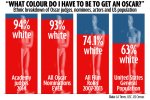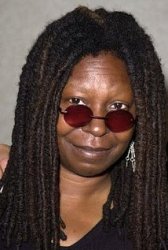 Spike Lee and Jada Pinkett Smith will be boycotting this year’s Academy Awards. Why? Because, for the second consecutive year, all 20 of the acting nominees are white. Even Academy president Cheryl Boone Isaacs, who is African American, has expressed her disappointment with the lack of diversity in the nominees. She’s said she was “heartbroken and frustrated” by the lack of diversity. Actor David Oyelowo, who many feel was snubbed last year for his performance as Martin Luther King in Selma, said that the nominations don’t reflect him or “this nation.”
Spike Lee and Jada Pinkett Smith will be boycotting this year’s Academy Awards. Why? Because, for the second consecutive year, all 20 of the acting nominees are white. Even Academy president Cheryl Boone Isaacs, who is African American, has expressed her disappointment with the lack of diversity in the nominees. She’s said she was “heartbroken and frustrated” by the lack of diversity. Actor David Oyelowo, who many feel was snubbed last year for his performance as Martin Luther King in Selma, said that the nominations don’t reflect him or “this nation.”
As a black actor who is a connoisseur of the Academy Awards and one who is well aware of the lack of minority recognition in its history, I have an opinion on this. But it’s one that has nothing to do with The Academy. First, I’d like to say that this isn’t just about black actors. This is about ALL minority actors who are left out, including Hispanics and Asians. With that said, the problem is the not The Academy. It is simply a byproduct of the issue. Just looking at this year and the acting categories, the biggest snubs are: Michael B. Jordan in Creed, Idris Elba in Beasts of No Nation, Benicio Del Toro in Sicario and Will Smith in Concussion. Can you see the problem in that? I’ve only listed four names. Last year, the big snub was David Oyelowo in Selma. That’s just one name.
Here’s what I’m getting at. The Academy can only nominate what they’re given to nominate. An outrage cannot be put at them because they only (realistically) had those options. If you consider just four performances against the other 20+ potential white candidates, the odds aren’t in their favor. I believe that the fault does not lie solely with the Academy, but with the industry itself. They are NOT one in the same. The Academy nominates what the industry gives it. The industry is the machine cranking out these contenders so it is the root of the issue. It isn’t cranking out enough diverse contenders. The blame begins with the directors, producers and casting directors who choose who stars in what. If you’ll notice, of those snubbed, only one didn’t have to be black. By that I mean that their character could have been played by anyone. The point I am trying to make is that a lot of minority nominees play real life people such as slaves or other roles that MUST be played by a person in a minority.
But here’s what will make the difference. Take, for example, Michael Shannon in 99 Homes, a performance that garnered quite a lot of critical praise. His character could have been played by a minority actor such as Javier Bardem or Ken Watanabe. But with roles like that, casting directors often select a white actor. Why? I won’t even begin to try to answer that question.
Let’s look at the directors who write the films they direct. For example, take Damien Chazelle’s Whiplash, a film written and directed by him. It was not adapted from any book or real event. It came fresh from the mind of Damien. If you’ve seen Whiplash, you know that Terrence Fletcher could have easily been played by a black or Asian person. Am I saying Damien Chazelle is a racist? No. Am I saying he has something against minorities or casting them? No. What I’m saying is that casting white actors is the norm. Without any statistical proof, it seems that most writers are more likely to write about what they know or write for people similar to themselves. When Damien Chazelle wrote Whiplash, chances are he wrote it with a white guy in mind. That’s not a bad thing nor is he to be at fault for that. It just brings up another point: The backbone of every film is a script. Nothing is done without. It is THE first step and sets the ball rolling. It tells what and who is needed to bring the work to life. If writers write for who and what they know best, then I suppose the deepest root of the issue begins with the writers. With that being the case, in order to change things we need to support minority  writers to write about their own lives and the world they live in.
writers to write about their own lives and the world they live in.
Let’s look at another side to that. Suppose any writer of any ethnicity writes a story starring people who are racially ambiguous. Those parts have to be cast. Directors, producers and casting directors most often do the casting. They cast actors who they know best. They tend to be most comfortable with actions who are of the same race as they are. And, though they may not be racist, are more likely to be comfortable working with people who are most like them. So, another issue is the need to have more minority casting directors, directors and producers. Let’s support them and push them up through the ranks.
In short, the issue with the “White Oscars” isn’t just The Academy. It’s the people who are supplying the Academy. It’s the lack of minority filmmakers with power. It’s the lack of films about or containing minorities. It’s the lack of box office results attached to those films. Thank goodness for the likes of Ang Lee, Denzel Washington, Javier Bardem, Morgan Freeman and others who have bridged the gap and proven that minority actors can be acclaimed and recognized. But they won’t be around forever and there aren’t enough of them. Sure, Denzel and Freeman may get the roles that are racially ambiguous, but what about the others? Look at Chadwick Boseman. His major roles have been playing Jackie Robinson and James Brown and he’s about to play Thurgood Marshall. All those roles HAVE to be played by an African American. Why not cast him as Mark Watney in The Martian or Mike Shiner in Birdman? Who says Don Cheadle couldn’t have played Birdman himself? I’ll tell you who. It’s the directors, the casting directors, the writers and the producers. Ironically enough, the writer, director and producers of Birdman (who won an Oscar for doing all of the aforementioned) is a minority himself. Yet there isn’t a single minority in a major role in that film.
We need filmmakers like that giving minorities opportunities. Don’t get me wrong. Tyler Perry does a lot for the black film community. But those are not films that will garner an actor the respect that the Academy can give. W e need filmmakers like Scorsese, O. Russell, Allen, Nolan, Fincher, Paul Thomas Anderson and many other acclaimed directors to push for casting minorities in their films. John Singleton and Spike Lee can’t do it alone.
e need filmmakers like Scorsese, O. Russell, Allen, Nolan, Fincher, Paul Thomas Anderson and many other acclaimed directors to push for casting minorities in their films. John Singleton and Spike Lee can’t do it alone.
To quote George Clooney who made a statement earlier about this issue, “There should be 20 or 30 or 40 films of the quality that people would consider for the Oscars. By the way, we’re talking about African Americans. For Hispanics, it’s even worse. We need to get better at this.” Yes Mr. Clooney, Hollywood must get better at this.
 In my opinion, DC clearly wins the DC vs. Marvel debate. DC has more relate-able, plausible, believable superheroes. It also has more cache. It is truly the darling of hip, nerdy, collector types. DC is also the underdog of the two companies, which makes me like it even more. They make less money than Marvel, put out fewer films and their properties, except for Batman and Superman, are less ubiquitous. However, DC is less PC! Marvel is the more “equal opportunity” comic empire. They use more women and people of color as character.
In my opinion, DC clearly wins the DC vs. Marvel debate. DC has more relate-able, plausible, believable superheroes. It also has more cache. It is truly the darling of hip, nerdy, collector types. DC is also the underdog of the two companies, which makes me like it even more. They make less money than Marvel, put out fewer films and their properties, except for Batman and Superman, are less ubiquitous. However, DC is less PC! Marvel is the more “equal opportunity” comic empire. They use more women and people of color as character.  been mining the properties on the big screen ever since. Marvel properties include The Avengers (Iron man, Thor, Hulk, Captain America, Hawkeye, and Black Widow), Spiderman, Silver Surfer, Fantastic Four, Guardians of the Galaxy and The X-men.
been mining the properties on the big screen ever since. Marvel properties include The Avengers (Iron man, Thor, Hulk, Captain America, Hawkeye, and Black Widow), Spiderman, Silver Surfer, Fantastic Four, Guardians of the Galaxy and The X-men. 







